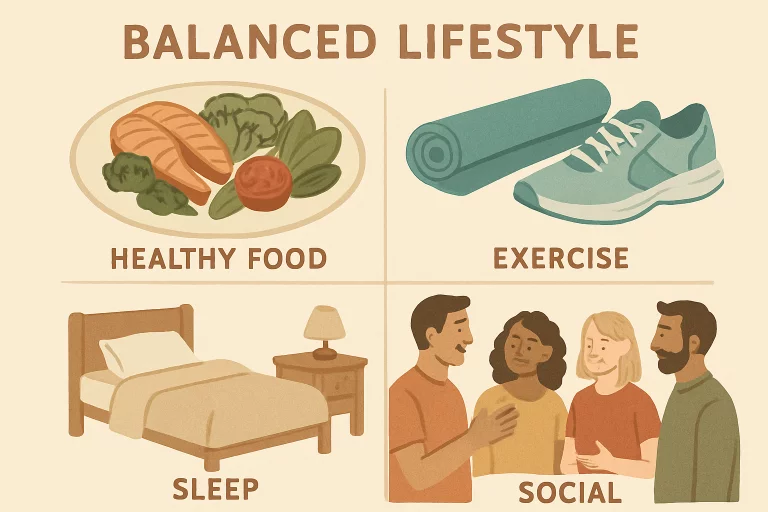Table of Contents
- Nutrition and Mental Health
- Physical Activity’s Role in Mental Wellness
- Importance of Quality Sleep
- Stress Management Techniques
- Social Connections and Mental Health
- Limiting Substance Use and Digital Dependency
Maintaining mental wellness is a dynamic, ongoing process that extends far beyond genetics or the circumstances into which we are born. Mental wellness is something that can be actively nurtured and enhanced through deliberate choices and lifestyle shifts. Every day, the decisions we make regarding how we eat, move, sleep, manage stress, and connect with others have a profound impact on our mental well-being. By consciously cultivating habits that support both body and mind, we don’t just make positive changes for today; we also lay the groundwork for lasting well-being. These adjustments can create lasting patterns of emotional resilience and psychological well-being for the future. For anyone experiencing persistent sadness, difficulty managing emotions, or more complex mental health challenges, consulting a depression doctor can offer expert support and treatment options, to be used alongside these healthy lifestyle interventions. Lifestyle factors, including nutrition, exercise, sleep, stress management, and social connections, have a profound influence on mental health. Small, consistent improvements in these areas can significantly boost emotional resilience and overall well-being. Embracing these changes helps create balance, lowers the risk of mental health issues, and enhances our ability to cope with life’s challenges.
Nutrition and Mental Health
Nutrition plays a vital role in mental health by directly influencing brain function and emotional stability. Diets rich in whole, nutrient-dense foods such as those high in healthy fats, vitamins, antioxidants, and lean proteins support the production of key mood-regulating neurotransmitters like serotonin and dopamine. Omega-3 fatty acids found in foods like salmon and flax seeds are especially noted for their ability to ease depression and stabilize mood. Additionally, fiber-rich foods support a healthy gut microbiome, which research increasingly links to better emotional regulation. A balanced, colorful diet helps promote overall mental well-being.
Physical Activity’s Role in Mental Wellness
Movement benefits both the body and mind, playing a decisive role in improving mental health. Regular physical activity such as walking, swimming, or dancing boosts mood, reduces anxiety and depression, and enhances overall psychological resilience. It triggers the release of brain chemicals such as endorphins and serotonin, which help relieve stress and promote a sense of well-being. According to U.S. News, moderate exercise can improve mental and brain health by up to 54%. Physical activity also supports brain growth by stimulating the formation of new connections and brain cells. Mind-body practices, such as yoga or tai chi, further enhance mental calm and physical relaxation. Even a simple, consistent routine can build confidence, provide structure, and improve motivation.
Importance of Quality Sleep
Sleep is not just a passive state but a time when the brain works hard to restore, heal, and regulate our emotional and cognitive functions. Chronic sleep deprivation or irregular patterns can disrupt the balance of mood-related hormones and increase vulnerability to mental health disorders like depression, anxiety, and irritability. Establishing a regular, calming bedtime routine—such as reading, gentle stretching, or mindful breathing—helps signal your body to transition into rest mode. Creating a sleep-friendly environment free of screens, noise, and artificial light further strengthens your body’s natural circadian rhythms, promoting longer and deeper sleep cycles. Avoiding caffeine and intense exercise late in the day, and seeking out natural daylight in the morning, may also help reset your internal clock, making it easier to fall asleep and stay asleep throughout the night. Quality sleep restores your brain, sharpens memory and focus, and fortifies your resilience to stress. Read about the importance of sleep in mental wellness and discover tips for enhancing your nightly rest.
Stress Management Techniques
Stress affects nearly every part of mental and physical health. While short-term stress is normal and sometimes necessary, chronic stress can harm memory, mood, and increase the risk of mental health issues. Effective stress management techniques, such as mindfulness, yoga, deep breathing, and muscle relaxation, can help lower cortisol levels and promote a sense of calm. Engaging in hobbies, nature, creativity, or gratitude journaling also helps build resilience. Regularly practicing these strategies can reduce stress and improve overall well-being.

Social Connections and Mental Health
Humans thrive on connection, and strong social bonds are essential for emotional well-being. Meaningful relationships with family, friends, or the community help reduce stress, prevent loneliness, and boost resilience. Engaging in group activities, volunteering, or simply spending time with loved ones fosters a sense of belonging, identity, and hope—all of which are crucial for maintaining mental health.
Limiting Substance Use and Digital Dependency
Substance use and excessive screen time can negatively impact mental health, contributing to anxiety, depression, and poor sleep. Reducing or eliminating these habits supports clearer thinking and emotional balance. Setting digital boundaries and replacing unhealthy habits with offline activities can promote well-being, and seeking professional help is encouraged for those facing challenges in making changes.
Conclusion
Adopting healthy lifestyle habits, such as fostering social connections and minimizing harmful behaviors, can significantly enhance mental well-being. While progress takes time, small, consistent steps build emotional strength. For deeper support, mental health professionals can offer personalized guidance to help individuals achieve optimal well-being and thrive.


